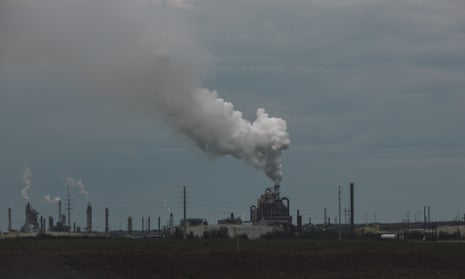Canada will require its fossil fuel industry to cut its emissions between 35% to 38% below 2019 levels starting in 2030, it was announced on Thursday.
The prime minister Justin Trudeau’s government plans to limit emissions from the oil and gas sector through a national cap-and-trade system which he first proposed in his 2021 election campaign, according to the policy announcement.
“Every sector of Canada’s economy must do its part to combat climate change and build a safe, prosperous, and healthy future for Canadians,” said Canada’s environment minister, Steven Guilbeault, in a statement made from the Cop28 UN climate conference in Dubai. He added: “All sectors of our economy need to reduce their emissions and that includes oil and gas companies.”
The policy, part of Canada’s plan to reach net-zero by 2050, works by setting a limit on emissions, and having companies that do not meet that benchmark buy and trade emission allowances with other producers.
The newly introduced framework states that facilities would be able to buy a limited amount of carbon offset credits – which have faced questions over their effectiveness in cutting planet-heating emissions – or contribute to a decarbonization fund.
The cap would cover all greenhouse gas emissions and apply to oil and gas companies, offshore facilities and liquefied natural gas producers. Together they represent roughly 85% of the sector’s emissions, according to the policy release.
The proposal was met with opposition from the premier of Canada’s main fossil-fuel producing province Alberta.
“We have been very firm in saying that we oppose any kind of arbitrary emissions cap, whether it’s on oil and gas emissions or whether it’s on methane,” Alberta’s premier, Danielle Smith, said on Thursday. Smith relayed her intentions to challenge the policy and produce a “constitutional shield” against the proposal.
“This proposed cap also undermines the unity of our country,” Smith said in a statement.
In response to the Canada’s announcement of the capping framework, Keith Stewart, senior energy strategist for Greenpeace Canada said: “This isn’t yet the ambitious emissions cap we need to set us on a path to the full, fast and fair phase-out of fossil fuels necessary to avoid the worst impacts of climate change.”
The government promises to publish draft regulations in mid-2024 with input from the industry.
Reuters contributed to this story
